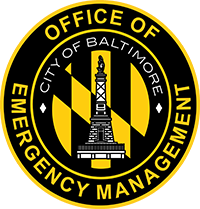


Baltimore City is prone to a number of natural and human-caused hazards. It is important to understand these different hazards and how they can affect your household, community, or business.
The City of Baltimore Disaster Preparedness and Planning Project (DP3) provides a detailed description of threats, vulnerabilities, and risks impacting the City. This plan is updated every five years with significant input from subject matter experts, the community, and
Baltimore City Disaster Preparedness and Planning Project (DP3)
Active shooter incidents are on the rise nationwide in recent years. Learn about what you should do if you find yourself in an active shooting event, how to recognize signs of potential violence around you, and what to expect after an active shooting takes place.
For additional Active-Shooter information.
Cyber incidents can have wide-ranging effects on individuals, organizations, the community, and at the national level. Learn about how you can increase your chances of avoiding cyber risks, what immediate actions you should take during cyber incidents, and what to do after a cyber incident.
For additional Cybersecurity information.
Explosive devices can be highly portable and are easily detonated from remote locations or by suicide bombers. Learn about the steps you can take to prepare for the unexpected.
For additional information on Explosions.
Baltimore City often experiences extreme heat and high humidity during the summer months, which makes your body work extra hard to maintain a normal temperature. Learn about the actions you can take when the weather turns hot.
For additional information on Extreme Heat.
For information about Code Red Alerts (for extreme heat) issued by the Baltimore City Health Department.
Flooding is one of the most common hazards across the nation and it can occur during any season. Learn about what you can do before, during, and after a flood.
For additional Flood information.
You are at risk if a chemical is used unsafely or released in harmful amounts into the environment where you live and work. Learn about what you can do before, during, and after a hazardous materials incident.
For additional Hazardous Materials Incidents information.
In just a matter of minutes, a residence can be engulfed in flames. Learn about how you can try to prevent home fires and what to do in the event of a home fire.
For additional information on Home Fires.
Hurricane season in the eastern United States runs from June 1st to November 30th and brings heavy rain, strong winds, floods, and coastal storm surges. Learn about how you can prepare for hurricane season and know what to do before, during, and after a hurricane.
For additional information on Hurricanes.
View a map of hurricane inundation zones in Baltimore City.
In our increasingly interconnected world, infectious diseases such as influenza can spread very easily. Learn about the measures you can take to protect yourself during a pandemic.
For additional Pandemic information.
Power outages can occur at any time and for a variety of reasons, including severe weather. Learn about how you can prepare for power outages in your community and workplace.
For additional information about Power Outages.
If you would like to report a power outage to BGE, call (877) 778-2222 or visit their Report An Outage page.
Severe weather happens across the nation throughout the year and can include hazardous conditions produced by thunderstorms and winter storms, which can bring sudden impacts to any community. Learn about the potential impacts of severe weather in your area and what you can do to be prepared.
For additional Severe Weather information.
Winter storms create hazardous conditions resulting from low temperatures, rain, snow, and ice. Learn about how you can prepare for winter storms and protect yourself when they arrive.
For additional Winter Weather information.
Learn more about Code Blue Alerts (for extreme cold) issued by the Baltimore City Health Department.